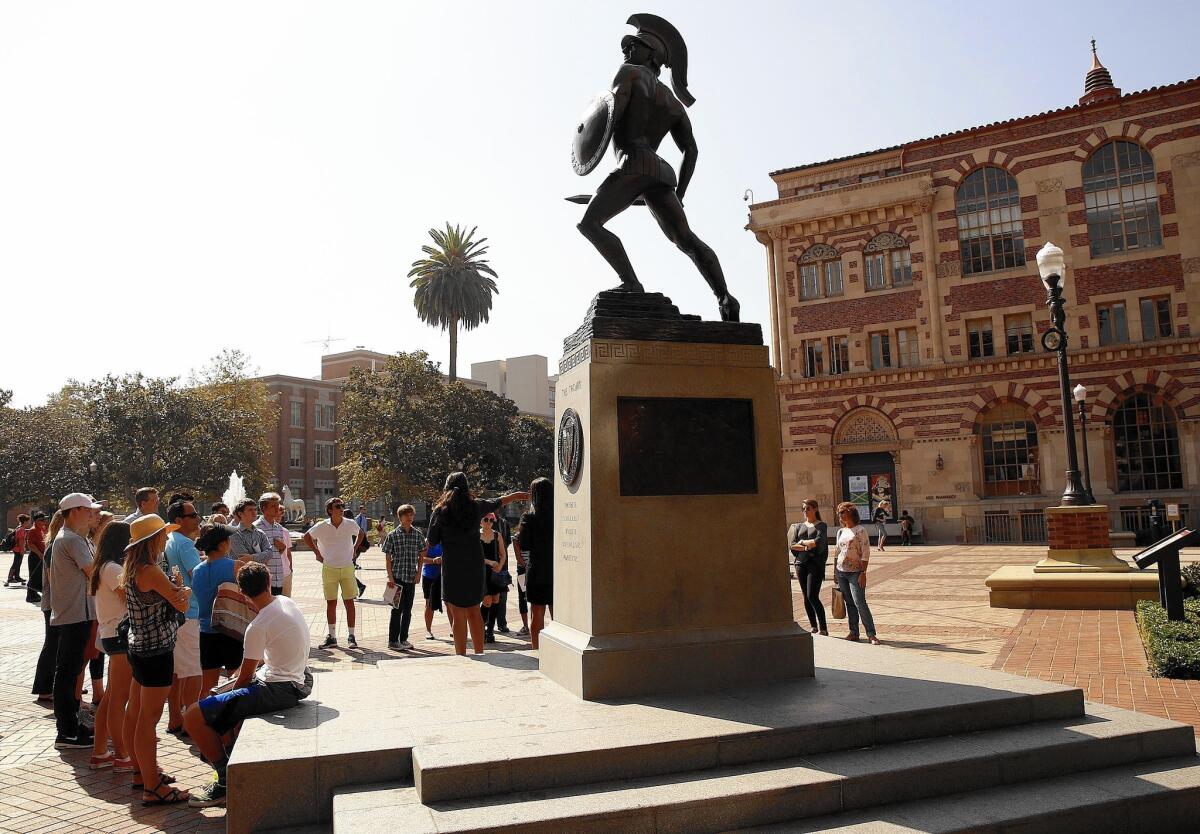USC’s tuition will top $50,000 for the first time

- Share via
USC, always striving to reach new heights, is set to cross a dubious milestone: Tuition for the 2016-2017 academic year will surpass $50,000 for the first time.
With a price tag of $51,442 for tuition and an additional $841 in fees, USC is sure to be in the running for the unofficial title of most expensive place in the country to get a college degree. According to U.S. News & World Report, Vassar College in New York won that honor for the current school year by charging $51,300 in tuition and fees. Even Harvard, that paragon of academic excellence, charges undergraduates a mere $45,278 in tuition and fees.
Join the conversation on Facebook >>
The bigger tuition bill comes as USC is rising both in academic reputation and as a financial powerhouse. In two decades, it has climbed from 51st to 23rd in U.S. News & World Report’s rankings of national universities. It’s now in the midst of a $6-billion fundraising drive.
“We’re competing with the Stanfords and the Ivy League schools of the world, and when you’re competing for best faculty in the world, that’s expensive,” said USC Provost Michael Quick. “As we build infrastructure, that’s expensive.”
Still, tuition hikes have been controversial on campus, with USC’s student government passing a resolution in the fall asking administrators to institute a tuition freeze.
USC officials released the new tuition figure this week. The tuition alone is $1,978 higher than what current students are charged. It’s also significantly more than Stanford’s $45,729 tab and the $47,600 students are charged at Yale.
Factoring in the cost of books and living expenses, the total cost for one Trojan year will be almost $70,000, USC officials estimate.
Luckily, that eye-popping amount “doesn’t necessarily tell you much about actual affordability,” said Robert Shireman, a senior fellow with the Century Foundation think tank. “The sticker price is only relevant to people with very high incomes.”
Indeed, almost two-thirds of USC undergraduates receive financial aid, according to the university.
Last year, USC students received nearly $480 million in financial aid, including $275 million in school grants and scholarships, $22 million in federal grants and $132 million in federal and private loans, according to school figures.
That means USC graduates are leaving Los Angeles with less student debt. Members of USC’s class of 2014 who took out loans owed about $28,500 when they graduated, on average, according to the school. Nationwide, students who graduated from U.S. colleges that same year — and borrowed money to earn their degrees — owed an average of nearly $29,000, according to a study by the nonprofit Institute for College Access and Success in Oakland.
Overall, 45% of USC students take on debt. That’s a relatively low number, according to Debbie Cochrane, the institute’s director of research.
Other wealthy schools had even lower student debt figures. For example, the 23% of Stanford students who graduated with debt owed about $19,000, according to the institute.
“Alarm bells will go off
for students and families over tuition, but it’s only part of the picture,” Cochrane said.
Quick said school administrators try to keep increases as low as possible while also funding needed programming and capital projects, including renovations to the university’s science labs and increasing mental health counseling services and job placement services.
“Our students and parents are expecting value in their education, and the bottom line is it sometimes takes money to provide that value,” Quick said.
Quick said he and other administrators monitor data on student debt to make sure that cost increases don’t go too far and try to find donors for many of the projects. .
“We’re always mindful of the cost to students,” he said.
For the current academic year, USC is the 12th most costly private university in the nation, according to U.S. News.
USC has been moving steadily toward the $50,000 milestone since 1968. That was the last time university trustees opted not to raise tuition, according to figures compiled by members of the school’s student government.
The student leaders, in seeking the tuition freeze, noted that the University of California hasn’t raised
its tuition in the last five years.
Rini Sampath, USC’s student body president, said she was frustrated that administrators went the other way. They also ignored other parts of the student government resolution, including a request to set up a website that would explain how tuition money is spent, among other things.
“It feels like we didn’t really get anywhere,” Sampath said.
Twitter: @byjsong
MORE EDUCATION NEWS
How a security upgrade makes it harder to apply for financial aid this year
Sale of drug rights will bring UCLA hundreds of millions for research
More to Read
Sign up for Essential California
The most important California stories and recommendations in your inbox every morning.
You may occasionally receive promotional content from the Los Angeles Times.











